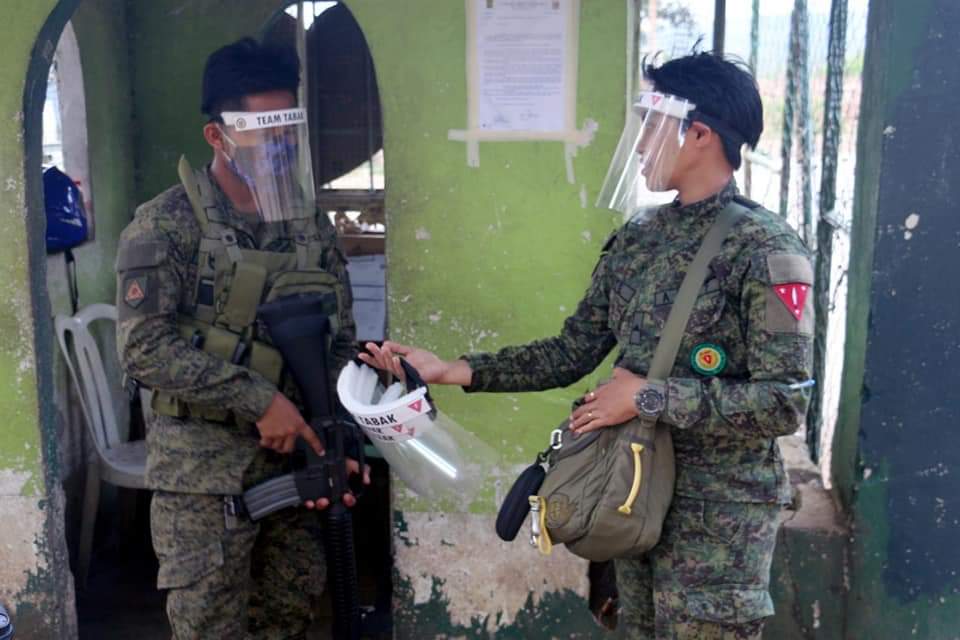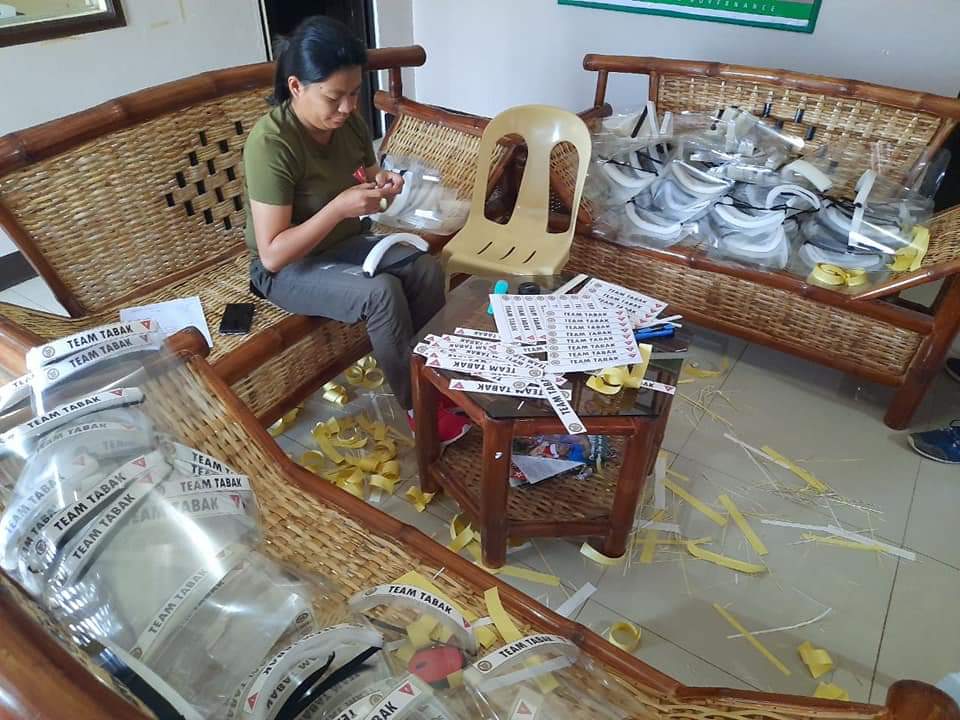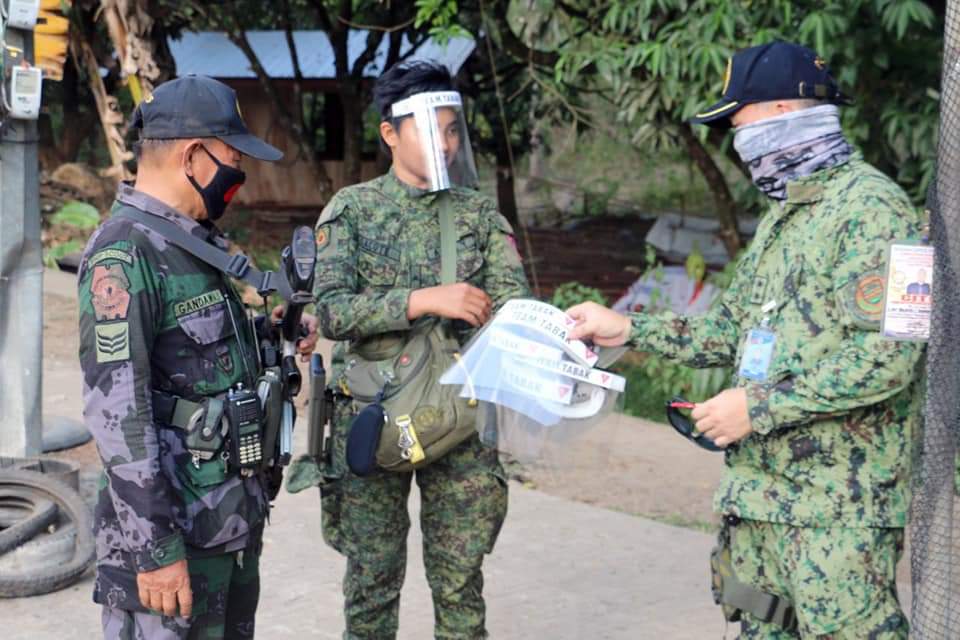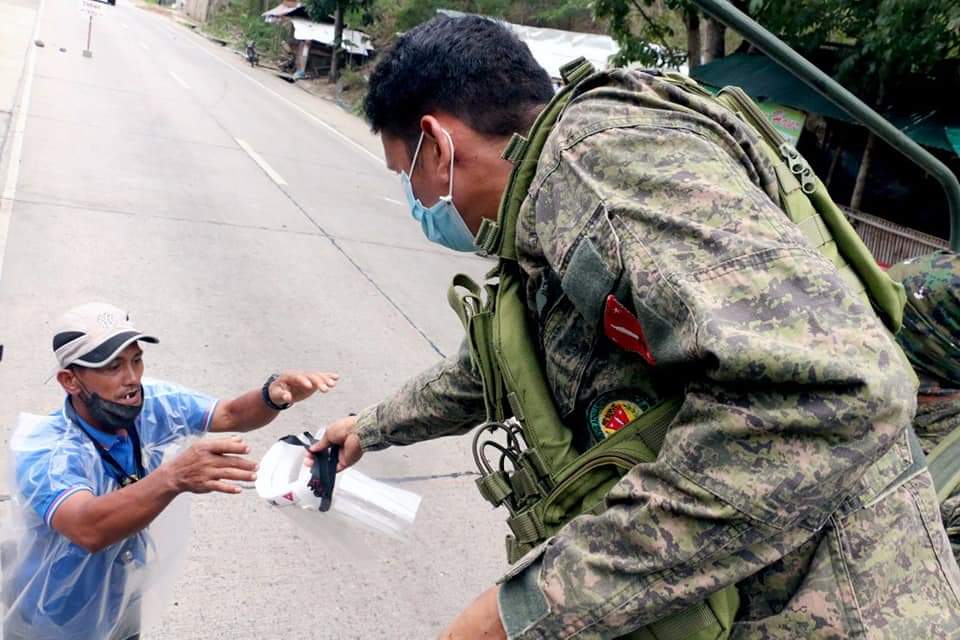Worried over COVID-19, troops wear spit shields in Zamboanga del Sur

A soldier from the 1st Infantry Division in Labangan, Zamboanga del Sur distributes face shields to frontliners. CONTRIBUTED PHOTO
PAGADIAN CITY, ZAMBOANGA DEL SUR — Before, they used to brace themselves against bombs and terrorist attacks.
Now, they’re coming up with a shield to protect their faces in case someone sneezes in front of them at the checkpoints where they monitor the government quarantine measures to stop the spread of the 2019 coronavirus disease (COVID-19).
Anxious over their unseen enemy and faced by the current shortage of surgical masks, soldiers here crafted improvised spit shields to protect troops against the infection.
First ID spokesperson Captain Clint Antipala said they could no longer find masks for their troops serving the checkpoints 24/7, so they improvised ones out of acetate film or PVC cover, insulator foam, garter and sewing materials.
Antipala said troops and trainees crafted these improvised face shields during their free time hoping these could protect the troops against the deadly virus. The design and materials for the face shields had been approved by military doctors from the Tabak Division, Antipala said.
Article continues after this advertisement
Soldier assembles improvised face shields for frontliners serving the COVID-19 checkpoints. CONTRIBUTED PHOTO
But he explained that the face shields would only serve as immediate protection in case the troops would face individuals who would sneeze or cough right at their faces. He said doctors still advised the use of appropriate masks if they had one, instead of the shields, to protect themselves against the virus.
Article continues after this advertisementStill, Maj. Gen. Gene M. Ponio, the 1st Infantry Division commander, said he was delighted by the ingenuity of the troops.
“We will support this simple initiative to protect the troops and health workers in the frontline,” said Ponio. “We also urge the public to be patient and cooperate to contain or prevent the spread of COVID-19,” Ponio added, referring to the 2019 coronavirus, which first emerged in Wuhan, China towards the end of last year and had spread to become a worldwide pandemic.
While masks were among the items that had been banned in many places of Mindanao at the height of bombings and attacks last year, now at the checkpoints, almost everyone, including the soldiers, have been wearing masks.

A soldier from the 1st Infantry Division in Labangan, Zamboanga del Sur distributes face shields to frontliners. CONTRIBUTED PHOTO
In nearby Labangan town and even in Cagayan de Oro City, the lack of masks prompted people to improvise.
Taking a cue from the nurses in a private hospital in Pagadian City, the COVID-19 Task Force in Labangan town came up with protective shields using transparent plastic folders, foam, big plastic bags, among others, said Marvin Julius Pagaduan, local disaster risk reduction and management officer.
In Cagayan de Oro City, local governments caught by surprise by the upsurge of COVID-19 cases were in a quandary where to buy thermal guns and other equipment to fight the deadly virus.
“We have the money and we want to buy more thermal guns but there is no supplier who could get us some,” said Maricel Casiño-Rivera, Cagayan de Oro public information officer.
As a result, policemen at a quarantine checkpoint in Baloy resorted to spraying the hands of passing motorists with water because they did not have thermal guns to measure their temperature.
Health workers serving the quarantine checkpoint in Alae, Manolo Fortich town have only one thermal gun for the hundreds of commuters entering the province of Bukidnon.

A soldier from the 1st Infantry Division in Labangan, Zamboanga del Sur distributes face shields to frontliners. CONTRIBUTED PHOTO
In the previous week, Dr. Jose Chan, chief of the Northern Mindanao Medical Center, sounded an appeal for masks, protective gloves, and alcohol for their medical staff.
Although a number of civic clubs and individuals heeded the call and came up with donated masks, gloves, and even food for the hospital medical staff, the city had practically ran out of face masks and alcohol that health officials started advising residents to wash their hands with soap and water as often as possible, which was just what the doctors have recommended.
An infectious disease specialist earlier advised that using soap and water was the best way to fight the virus and that using alcohol merely came in second.
Dr. Kathryn Roa, an infectious disease specialist in Davao hospitals, earlier said people did not need to wear a mask except when they were sick and that healthy people wearing surgical masks would only contribute to the shortage of protective equipment for healthcare workers in the forefront of the global pandemic.
But some people have felt apprehensive without masks that groups like the Cagayan de Oro Press Club (COPC) have come up with masks made from discarded clothes.
COPC president Manny Jaudian said the cloth masks would be distributed to reporters and media workers who could not afford to buy surgical masks.
Other media workers like former ABS-CBN station manager Donna Ocampo had started making improvised face screens made of plastic and distributed 200 of them to the medical staff of the NMMC.
For more news about the novel coronavirus click here.
What you need to know about Coronavirus.
For more information on COVID-19, call the DOH Hotline: (02) 86517800 local 1149/1150.
The Inquirer Foundation supports our healthcare frontliners and is still accepting cash donations to be deposited at Banco de Oro (BDO) current account #007960018860 or donate through PayMaya using this link.